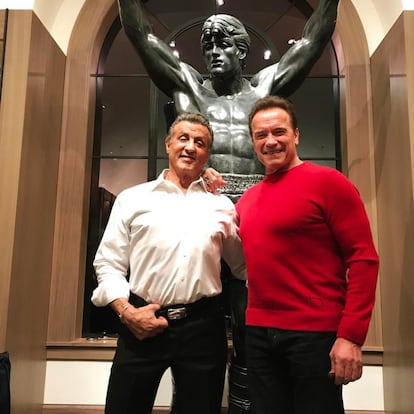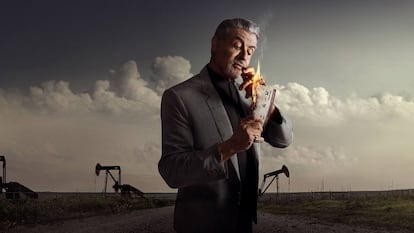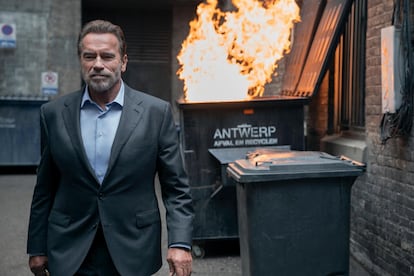Schwarzenegger and Stallone renew their rivalry on television
The two stars are now competing on the small screen with their debut series and documentaries in which they recount the competition that made them the most sought-after actors of the 1980s

There was a time, in the 1980s and 1990s, when Sylvester Stallone and Arnold Schwarzenegger were the most sought-after actors in Hollywood, and their films, the highest-grossing. They rivaled each other in every element, from box office clout to the number of henchmen killed on screen. “We were like little kids. Who uses bigger knives? Who uses the biggest guns and holds them in one arm? Who has more muscles, who has more muscle definition, who has less body fat? We fought over stupid stuff,” explains Schwarzenegger in Sly, the documentary produced by Stallone himself in which he recounts his life. Stallone tells more or less the same story of the continuous rivalry in Arnold, a docuseries about Schwarzenegger. The premiere of both productions coincided last year with their television fiction series debuts. The old rivals, now septuagenarians and friends, are dusting off their old feud on the small screen.
The race to regain their laurels was initiated by Stallone with the premiere in late 2022 of Tulsa King, a crime series with traces of comedy but that gains in darkness and nuances as it progresses — not in vain its creator is Taylor Sheridan (Yellowstone) and its roster of screenwriters includes Terence Winter (Boardwalk Empire) — in which he plays an old mobster banished by his bosses to Tulsa (Oklahoma), where his old-school tricks, confronted by a modernity in which by comparison everyone appears soft, soon make him the master of the city. Last spring, Schwarzenegger starred in Fubar, a pyrotechnic and crude action comedy written by Nick Santora (Reacher) in which he plays a family man and super-spy who discovers that his daughter works for the same government agency as him and, like him, has kept it from the whole family. Netflix simultaneously released Arnold, and a few months later Sly, a feature film framed like his old competitor’s docuseries in the booming subgenre of the hagiographic documentary.

The similarities and differences between the two productions function as a correlation of those of their two protagonists. Schwarzenegger was born in the small Austrian town of Thal in 1947, into a humble family, and, like Stallone — born a year earlier in an equally modest home in New York — always had a strained relationship with his father, who had belonged to the Nazi party. The Rocky star’s father was a hairdresser with a military background, and in Sly his son implies that his treatment of him was brutal.
Both were fascinated as children and teenagers by sword-and-sandals movies starring American bodybuilders who migrated to Italy to make their way on screen as Hercules and other mythical giants. Stallone always wanted to devote himself to movies, while Schwarzenegger became the most-awarded bodybuilder in history in the 1970s. His future screen rival’s career did not take off until, when selling his screenplay for Rocky, for which he would win an Oscar in 1977, Stallone made the condition he would also star in the movie. By the time Schwarzenegger decided to make the leap to the big screen, Stallone was already a Hollywood giant. Conan the Barbarian, the film that turned the bodybuilder into a movie superstar, was released in March 1982. Two months later, Rocky III followed, and half a year after that the first in Stallone’s other great franchise, First Blood. The Terminator would arrive in the fall of 1984. Rambo: First Blood Part II, in the spring of 1985.
The battle was on. From the outset, Schwarzenegger bet on being a machine of destruction, a role made to measure for someone who had been tipped for big screen failure as he possessed practically no acting skills. Stallone, since his first incarnation as the Italian Stallion, had been pigeonholed in underdog roles, the loser who, against all odds, ends up winning. “In my world, the Stallone film world, what wouldn’t normally happen can happen. I’m in the business of hope,” he says in Sly. That’s why he refused to have John Rambo killed off at the end of First Blood, as was the case in the novel on which the film was based. What came next, the leap to increasingly testosterone-based and outlandish action, and the conversion of his heroes into Reaganite icons, was the result of Stallone’s inability to slow the mad dash with his European rival, and economic voracity. “I wanted to make that genre something that would be lucrative and would travel around the world, and it did,” he says.
The leap into comedy was the most extravagant twist in that perpetual pugnacious struggle, and it only worked out well for Schwarzenegger, who took the lead. Both Sly and Arnold recall something the two have laughed about frequently on television: that when Schwarzenegger got the script for Stop! Or My Mom Will Shoot he immediately dismissed it, but pretended to be interested. Stallone took the bait and accepted the role to avoid another hit for his competitor. The film was one of the most resounding failures with audiences and even critics, which is saying something, of his career.
Schwarzenegger also recalls that in 2003, in the middle of his election campaign, the Los Angeles Times published testimonies of six women who accused him of sexual harassment. Schwarzenegger admitted to having “behaved badly” and to having done “things that were not right which I thought then was playful” but that he recognized that he had offended people, to whom he apologized. Me Too was still to come, so that was enough for the time: he became governor of California with 48% of the vote and four years later was re-elected with an absolute majority. In the documentary, he acknowledges his infidelities and talks about the secret child that cost him his marriage.
In Sly, by contrast, there is barely a reference to the death of Stallone’s firstborn son, Sage. The incursions into his private life end there, and in the mentions of his relationship with his father and his search in the public’s appreciation for a substitute for the paternal recognition that the actor never felt. In the end, the parallel lives of the two rivals can be told, and are told, as tales of success and self-improvement that reflect the power of self-belief and exemplify the fantasy of the American dream, the one Stallone never lets go of in his underdog stories. Although Schwarzenegger, more open than his colleague, acknowledges that he would not have got to where he has without the help of many people who took a chance on him. And, against the odds, he not only denies that he is what has come to be called a self-made man, but says he is repulsed by the concept.

The television adventure of both stars, far from the status they once had, but whose legacy is obvious — before the body counts of John Wick there were theirs, and without their steel muscles we would not have those of Vin Diesel or Dwayne Johnson amassing bills by the bucketful — looks set to continue. Both Tulsa King and Fubar have been renewed for second seasons. And, in the absence of references to his personal life in Sly, Stallone has also premiered The Family Stallone, a reality show in which he co-stars with his third wife, Jennifer Flavin, and the three daughters they have together, and in which he plays the endearing patriarch.
Of course, the two actors have other fronts open. Stallone has a portfolio full of film projects, not only in front of the camera but also behind it (he has directed eight feature films and written the screenplays for more than 20 during his career). Schwarzenegger, without renouncing the screen, has long taken advantage of his fame to launch political reflections and inspirational messages on the Internet, and has now taken a step further as a guru with the publication of Be Useful: Seven tools for life, a self-help book in which he gives advice on how to succeed in life. They may no longer be around to hold up implausible machine guns with one arm, but Stallone and Schwarzenegger are still billing at full capacity.
Sign up for our weekly newsletter to get more English-language news coverage from EL PAÍS USA Edition
Tu suscripción se está usando en otro dispositivo
¿Quieres añadir otro usuario a tu suscripción?
Si continúas leyendo en este dispositivo, no se podrá leer en el otro.
FlechaTu suscripción se está usando en otro dispositivo y solo puedes acceder a EL PAÍS desde un dispositivo a la vez.
Si quieres compartir tu cuenta, cambia tu suscripción a la modalidad Premium, así podrás añadir otro usuario. Cada uno accederá con su propia cuenta de email, lo que os permitirá personalizar vuestra experiencia en EL PAÍS.
¿Tienes una suscripción de empresa? Accede aquí para contratar más cuentas.
En el caso de no saber quién está usando tu cuenta, te recomendamos cambiar tu contraseña aquí.
Si decides continuar compartiendo tu cuenta, este mensaje se mostrará en tu dispositivo y en el de la otra persona que está usando tu cuenta de forma indefinida, afectando a tu experiencia de lectura. Puedes consultar aquí los términos y condiciones de la suscripción digital.








































